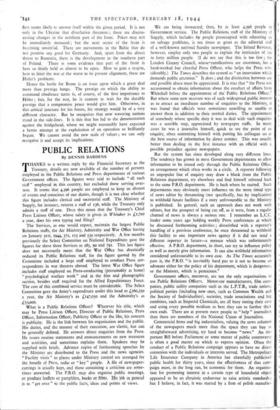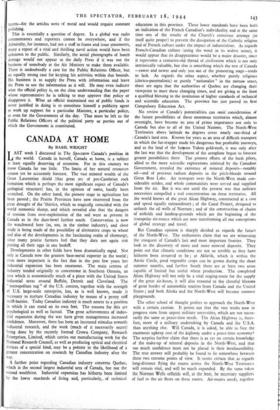PUBLIC RELATIONS
By DENNIS BARDENS The Services, as one would expect, maintain the largest Public Relations staffs, the Air Ministry, Admiralty and War Office having on January 31st, 1944, 371, 115 and 530 respectively. A few months - previously the Select Committee on National Expenditure gave the • figures for these three Services as 285, 90 and 791. This last figure does not necessarily mean that the War Office has drastically reduced its Public Relations staff, for the figure quoted by the Committee included a large staff employed to conduct Press cor- respondents in war theatres abroad. The latest War Office figure
• .includes staff employed on Press-conducting (presumably at home) "psychological warfare work" and in the film and photographic menial, besides staff required for the Allied Expeditionary Force. The cost of this combined service must be considerable. The Select Committee gave the Army's expenditure under this head as L260,350 a year, the Air Ministry's as £147,050 and the Admiralty's as
£51000.
What is a Public Relations Officer? Whatever his title, which may be Press Liaison Officer, Director of Public Relations, Press Officer, Information Officer, Publicity Officer or the like, his concern is publicity. He is the link between his organisation and the public. His duties, and the manner of their execution, are elastic, but can be generally defined. He answers direct enquiries from the Press. He issues routine statements and announcements on new measures and activities, and sometimes explains them. Speakers may be supplied with briefs. Advance copies of forthcoming speeches by the Minister are distributed to the Press and the news agencies. "Facility visits" to places under Ministry control are arranged for • the benefit of Press, radio or " key " people. A file of newspaper- cuttings is usually kept, and those containing a criticism are some- times answered. The P.R.O. may also organise public meetings, or produce leaflets or pamphlets, books or films. His job in general is to "get over" to the public facts, ideas and points of views. We are being instructed, then, by at least 4,396 people in Government service. The Public Relations staff of the Ministry of Supply, which includes 69 people preoccupied with educating us on salvage problems, is ten times as great as the editorial staff of a well-known national Sunday newspaper. The Inland Revenue, however, employ only two people to explain the intricacies of tax to forty million people. (I do not say that this is too few ; the London County Council, whosesramifications are enormous, has a hard-worked but cheerful Press Officer, who helps the Press con- siderably.) The Times describes the systeni as "an innovation which demands public attention." It does ; and the distinction between use and possible abuse must be appreciated. It is true that "the Press was accustomed to obtain information about the conduct of affairs from Whitehall before the appointment of the Public Relations Officer." But where some new measure was of such widespread public interest as to attract an inordinate number of enquiries to the Ministry, it was found that officials were sometimes unwilling or • unable to answer them in addition to their normal duties. The appointment of somebody whose specific duty it was to deal with such enquiries was a sensible step, appreciated by newspaper staffs. In many cases he was a journalist himself, quick to sec the point of an enquiry, often contenting himself with putting his colleague on to the best source of information by direct contact. This was usually better than dealing in the first instance with an official with a possible prejudice against newspapers.
But the system has since developed along very different lines. The tendency has grown in most Government -departments to allow information to be issued only through the Public Relations Office. an arrangement which often works in a circle. A reporter following an unpopular line of enquiry may draw a blank from the Public Relations department, try elsewhere and find himself referred back to the same P.R.O. department. He is back where he started. Such departments may obviously exert influence on the more timid type of news editor by threatening (not specifically, but by implication) to withhold future facilities if a story unfavourable to the Ministry is published. In general, such an approach does not work with editors, but the prospect of being cut off, as it were, from a regular channel of news is always a serious -one. I remember an L.C.C. leader some years ago holding weekly Press conferences at which he discussed forthcoming activities ; dissatisfied with a reporter's handling of a previous conference, he once threatened to withhold this' facility to one important news agency if it did not send a different reporter in future—a menace which was unfortunately effective. A P.R.O. department, in short, can try to influence policy as well as merely give information. It can also withhold information considered unfavourable to its own case. As The Times accurately puts it, the P.R.01 "is inevitably hard put to it not to become an advocate either for the policy of his department, which is dangerous, or the Minister, which is pernicious."
Government offices, moreover, are not the only organisations to use Public Relations Officers. Motor-car manufacturers, film _com- panies, public utility companies such as the L.P.T.B, trade unions, political parties (including new ones, such as Common Wealth and the Society of Individualists), societies, 'trade associations and big combines, such as Imperial Chemicals, are all busy stating their case and using every possible medium as best they can to further their own ends. There are at present more people to " help " journalists than there are members of the National Union of Journalists.
Commercial firms and big industrialists, valuing the news columns of the newspapers much more than the space they can buy as straightforward advertising, try hard to become "news." An im- portant Bill before Parliament or some matter of public controversy is often a good matter on which to express opinion. Often the conduct of a Public Relations campaign appears to have no direct connexion with the individuals or interests served. The Metropolitan Life Insurance Company in America has cheerfully publicised public health for thirty years, since the effectiveness of that cam- paign must, in the long run, be economic for them. An organisa- tion for promoting interest in a certain type of household object appeared to be an altruistic endeavour to raise artistic standards ; but I believe, in fact, it was started by a firm of polish manufac-
turers—for the articles were of metal and would require constant polishing.
This is essentially a question of degree. In a global war radio conunentators and reporters cannot be everywhere, and if the Admiralty, for instance, had not a staff to frame and issue statements, many a report of a vital and thrilling naval action would have been unknown to the public. Similarly, the aerial photographs of bomb damage would not appear in the daily Press if it was not the business of somebody at the Air Ministry to make them available. There is undoubtedly a case for the Public Relations Officer, but an equally strong case for keeping his activities within due bounds. His business is to supply the Press with information and leave the Press to use the information as it will. He may even indicate what the official policy is, on the clear understanding that the paper whose representative he is talking to may approve that policy or disapprove it. What an official maintained out of public funds is never justified in doing is to constitute himself a publicity agent to work up support for a particular Minister, a particular policy, or even for the Government of the day. That must be left to the Public Relations Officers of the political party or parties out of which the Government is constituted.



























 Previous page
Previous page